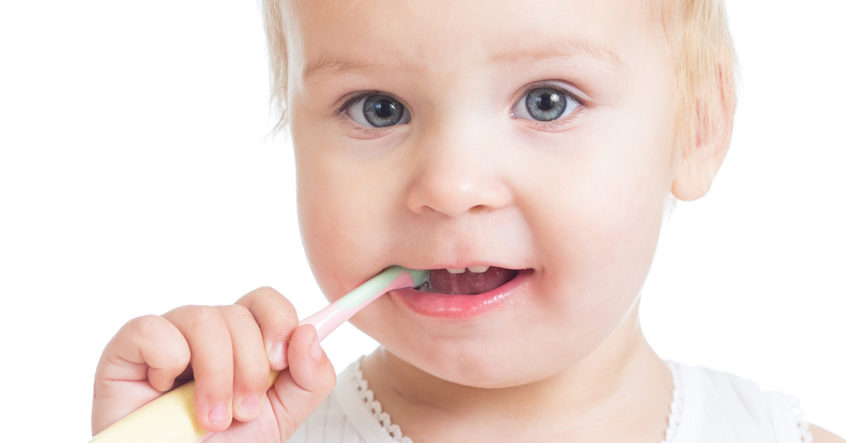A gurgling, sweet baby may still have nothing but gums to use on those delicious looking snacks you keep eating, but it’s never too early to start thinking about oral hygiene and health. Starting a good routine with your baby during the first few months of life can have a major positive impact on their dental health for life. Work these easy practices into your daily baby care routine to give your infant the best chance at a beautiful and sparkling smile.
Limit Bottle Time
It’s common today for parents to hand an older infant a bottle full of juice or watered down baby cereal in between feedings to help keep them satisfied. Unfortunately, those sugary drinks have a seriously damaging effect on the baby teeth that begin emerging as early as three months after birth. While the baby teeth are replaced by the adult teeth eventually, that’s no reason to let your child develop painful cavities so early in life. Limit bottle uses to feeding time only and offer water only as a supplemental drink. Even all-natural juices are too sweet and acidic to be given out freely.
Use the Pacifier
Many parents are rightfully concerned about pacifiers pushing on the teeth since it’s in the mouth for 18 hours a day or more with many children. However, thorough research demonstrates that pacifier use is only bad for oral health in children who continue to use one past the toddler stage. It’s fine for infants, babies, and young toddlers to continue using a pacifier, especially if it can be used to reduce the amount of juice or other sugary drinks given to calm down a fussy child. Just make sure you start weaning them off of the device around age 3 or 4 to avoid long-term alignment issues with the developing teeth.
Visit Early
At what age are you planning your child’s first dentist visit? Most parents wait until age two or three, but this is far too long. The American Academy of Pediatric Dentistry recommends that all children see the dentist at age six months for the first time. Even if your baby still has barely one tooth showing at that age, a check up determines how well the teeth are growing in and can correct problems before they worsen. Some infants that come in at six months already have cavities as well from bottle use.
Don’t Share Saliva
It’s tempting to demonstrate the airplane technique on yourself first, but a spoon that goes into your mouth and then the baby’s mouth is transferring bacteria your child isn’t ready to handle yet. Limiting saliva transfer between parents or other family members and the baby is the best way to let them develop a strong microbiome before other bacteria is introduced. It can be tricky to remember, but not sharing utensils or cups goes a long way in building a healthy mouth and smile.
Parental Dental Care
Finally, you need to have your mouth in good shape when caring for a baby to avoid transferring bacteria even accidentally. Many parents have active cavities or gum disease when raising a child and don’t realize that eventually, one slip-up will lead those unwanted bacteria to their children’s mouths. Get all your dental care out of the way before the child is born, so they’re welcomed into a healthy environment.

